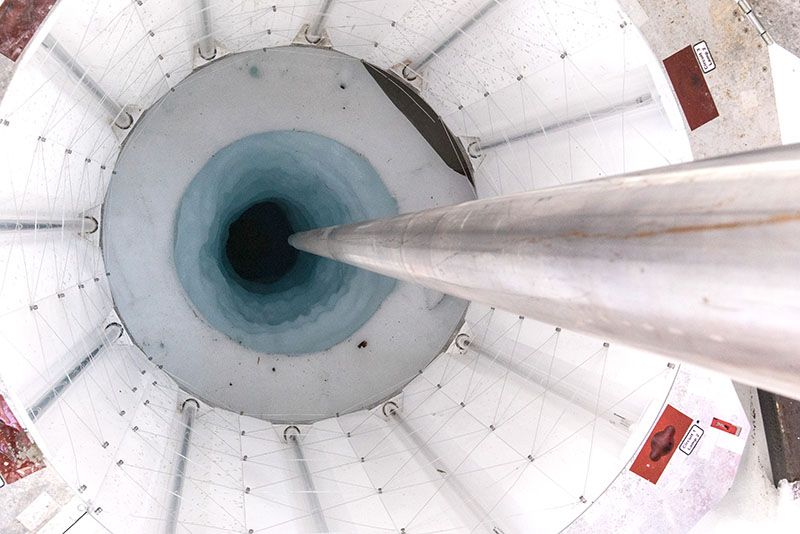Difference between revisions of "Lake Mercer"
Westarctica (talk | contribs) (Created page with "350px|thumb|Drill hole created by SALSA scientists to penetrate subglacial Lake Mercer '''Lake Mercer''' is a subglacial lake in Westarctica...") |
|||
| (2 intermediate revisions by one other user not shown) | |||
| Line 1: | Line 1: | ||
[[File:Mercer-Drill-Hole.jpg|350px|thumb|Drill hole created by SALSA scientists to penetrate subglacial Lake Mercer]] | [[File:Mercer-Drill-Hole.jpg|350px|thumb|Drill hole created by SALSA scientists to penetrate subglacial Lake Mercer]] | ||
'''Lake Mercer''' is a | [[Subglacial]] '''Lake Mercer''' is a lake in [[Westarctica]]. It has no surface area, and is covered by a sheet of ice 1,067 meters (3,501 feet) thick; the water below is hydraulically active, with water replacement times on the order of a decade from the [[Ross Sea]]. | ||
Lake Mercer is identified as high risk for a collapse of the [[West Antarctic Ice Sheet]] caused by [[global warming]]. Studies suggest that Mercer Lake as well as other subglacial lakes appear to be linked, with drainage events in one reservoir causing filling and follow-on drainage in adjacent lakes. | Lake Mercer is identified as high risk for a collapse of the [[West Antarctic Ice Sheet]] caused by [[global warming]]. Studies suggest that Mercer Lake as well as other subglacial lakes appear to be linked, with drainage events in one reservoir causing filling and follow-on drainage in adjacent lakes. | ||
==Exploration== | ==Exploration== | ||
Helen Amanda Fricker from the Scripps Institution of Oceanography discovered | Helen Amanda Fricker from the Scripps Institution of Oceanography discovered the lake by accident in 2007 while using satellite radar soundings to search for the grounding line of a nearby [[glacier]]. On 28 December 2018, the Subglacial Antarctic Lakes Scientific Access (SALSA) team, where Fricker serves on the executive committee of the project, announced they had reached Lake Mercer after two days of melting their way through the ice with a high-pressure hot-water drill. | ||
==Discovery of ancient life== | ==Discovery of ancient life== | ||
A preliminary report states that ancient carcasses of crustaceans and a tardigrade were isolated from the sediment samples. The | A preliminary report on the lake states that ancient carcasses of crustaceans and a tardigrade were isolated from the sediment samples. The samples contain enough oxygen to support aquatic animals, and bacteria are present with a density of at least 10,000 cells per milliliter. Other ancient materials retrieved from the sediments include shells of diatoms (a photosynthetic algae) and thread-like plants or fungi. How the crustaceans and tardigrade reached the lake is a matter of debate, but the scientists suspect that the gradual uplift of the Antarctic continent transformed shallow ocean bays into isolated lakes. The team plans to establish the age of the animal remains using radiocarbon dating, and will also try to sequence DNA from crustaceans to find out whether they belong to marine or freshwater species. | ||
The sediment cores will also be analyzed by geobiologists to study how relic organic matter deposited during marine incursions influences contemporary biodiversity and carbon cycling. | The sediment cores will also be analyzed by geobiologists to study how relic organic matter deposited during marine incursions influences contemporary biodiversity and carbon cycling. | ||
==Peerage title== | |||
On 22 March 2020, David Toalster was granted the title Baron Mercer, named in honor of this lake. | |||
[[Category: Science]] | [[Category: Science]] | ||
[[Category: Geography of Westarctica]] | [[Category: Geography of Westarctica]] | ||
Latest revision as of 09:46, 27 March 2020
Subglacial Lake Mercer is a lake in Westarctica. It has no surface area, and is covered by a sheet of ice 1,067 meters (3,501 feet) thick; the water below is hydraulically active, with water replacement times on the order of a decade from the Ross Sea.
Lake Mercer is identified as high risk for a collapse of the West Antarctic Ice Sheet caused by global warming. Studies suggest that Mercer Lake as well as other subglacial lakes appear to be linked, with drainage events in one reservoir causing filling and follow-on drainage in adjacent lakes.
Exploration
Helen Amanda Fricker from the Scripps Institution of Oceanography discovered the lake by accident in 2007 while using satellite radar soundings to search for the grounding line of a nearby glacier. On 28 December 2018, the Subglacial Antarctic Lakes Scientific Access (SALSA) team, where Fricker serves on the executive committee of the project, announced they had reached Lake Mercer after two days of melting their way through the ice with a high-pressure hot-water drill.
Discovery of ancient life
A preliminary report on the lake states that ancient carcasses of crustaceans and a tardigrade were isolated from the sediment samples. The samples contain enough oxygen to support aquatic animals, and bacteria are present with a density of at least 10,000 cells per milliliter. Other ancient materials retrieved from the sediments include shells of diatoms (a photosynthetic algae) and thread-like plants or fungi. How the crustaceans and tardigrade reached the lake is a matter of debate, but the scientists suspect that the gradual uplift of the Antarctic continent transformed shallow ocean bays into isolated lakes. The team plans to establish the age of the animal remains using radiocarbon dating, and will also try to sequence DNA from crustaceans to find out whether they belong to marine or freshwater species.
The sediment cores will also be analyzed by geobiologists to study how relic organic matter deposited during marine incursions influences contemporary biodiversity and carbon cycling.
Peerage title
On 22 March 2020, David Toalster was granted the title Baron Mercer, named in honor of this lake.
